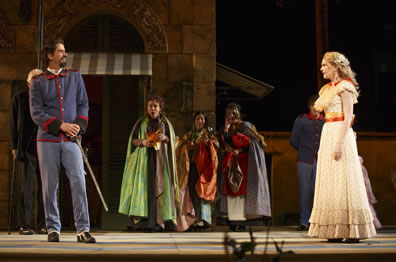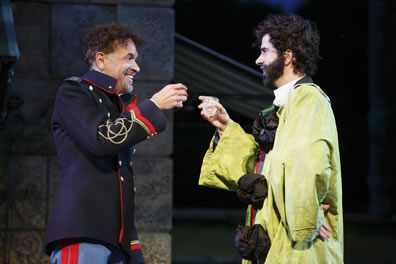Much Ado About Nothing
Much Ado, But Nothing Much Comes of It
The Public Theater Free Shakespeare in the Park, Delacorte Theater, New York, N.Y.
Friday, June 6, 2014, G/M–203 & 204 (right)
Directed by Jack O'Brien
It's like throwing spaghetti with meat sauce at the wall. Most of it ends up plopping to the floor, but a few strands and some sauce stick.

Does he or doesn't he? Even Benedick (Hamish Linklater) doesn't know for sure whether or not he truly loves Beatrice (Lily Rabe, right) in the Shakespeare in the Park production of William Shakespeare's Much Ado About Nothing at Delacorte Theater. Photo by Joan Marcus, Public Theater.
That is the impact of the Jack O'Brien–helmed production of William Shakespeare's Much Ado About Nothing, the first offering of Public Theater's Free Shakespeare in the Park season at Central Park's Delacorte Theater in New York. O'Brien cooks up a whole bunch of thematic strands with lush visuals and throws them at us, but only some of it really sticks. We saw an early preview version of this production, which officially opened last night, so perhaps its aim became surer and its sauce more consistent in the interim. Or, perhaps, O'Brien's approach is his production's ultimate joke: in style as well as context, this presentation is in every way much ado about nothing.
This is a play in which the subplot outweighs the main plot, that main plot skates through on the thinnest of ice, and both plots, turning on false witness as they do, turn out to be, literally, much ado about nothing. O'Brien—who won a Tony for his Henry IV at Lincoln Center, staged Macbeth there last winter, and served as artistic director for San Diego's Old Globe Theatre from 1981–2007—reflects the play's dual plots in his over-busy production in which a lot of nothing goes on.
John Lee Beatty's set design is a detailed circa 1900 Italian villa (with fetching costumes designed by Jane Greenwood), an orange grove to one side, a latticed wall covered in vines, potted flowers all around, and a vegetable garden at the front of the stage. This is Leonato's house, and servants and workers are constantly going to and fro, seeming to carry out their tasks as the main characters party, play, and plot; but, in fact, the workers end up doing nothing much at all. All of the members of this household speak Italian, too, until it's time to speak Shakespeare's script at which point they transition into Elizabethan English.
Among the tasks Antonio (Leonato's doddering brother, played by David Manis) has the workers do before the play proper starts is push the garden wall over to one side. Of course, they can't—it's a wall, after all. But the guitarist gets it done magically with music. Although the production returns to this joke later, it has no bearing on the plot or action; it is, let's say it together, much ado about nothing. A more subtler example is Benedick's association with rabbits. He pulls carrots out from the ground to chomp on like Bugs Bunny, he wears a hare visor for the masque, and he carries around two rabbits he has just killed as he hides and eavesdrops during his gulling scene. No point making much of this allegorical arc for it simply peters out, and at the end when the women are masked, it's Ursula wearing the fox visor, not Beatrice (from where we were sitting we couldn't make out Beatrice's mask).
When the theater's public address system welcomes the audience, Leonato's household already is milling about and engaging in conversations. They all stop and marvel at what to them is an aural apparition, a voice of God talking about late seating and cell phones. Its a good laugh, but it also is O'Brien's signal that we are seeing a play, a fantasy in the simplest sense of something elaborate yet not real. There's no need for us to make much ado about any of it.
Except that this is Shakespeare at his wittiest featuring, in Benedick and Beatrice, two of the most indelible and influential characters he ever wrote. Some in the audience want to make an intellectual investment in the play, and when that investment has no payoff, you risk shortchanging those people.
One strand in this production that delivers a huge payoff from start to finish is Hamish Linklater's insightful and brilliantly balanced portrayal of Benedick. He's becoming the Public's go-to comedian for its Central Park productions (the two Antipholi in Comedy of Errors, Aguecheek in Twelfth Night, Autolycus in The Winter's Tale), and all his Shakespearean instincts go into his Benedick. He nails the role's verse while giving us a richly rendered Benedick: a jester, but indignant at being called so; a blusterer, but claiming to be of modest bearing; a flirt, but avowing abstinence from women; a great show of confidence in public, but great lack of confidence when he thinks no one is watching.
He's not so much complex as conflicted, and it is in this vein that Linklater plays the gulled Benedick pursuing Beatrice; he does so against his true nature, if not unwillingly, and he obviously is out of his element when courting her. But, oh, how he will give it all he's got because that's what he does. In the end, it finally dawns on him that he's been played in a practical joke, so he reverts to his professed persona. However, when the two read the letters each had written in private and he sees her true heart—and he knows she has seen his—he finally finds a comfort zone. He and Beatrice will love each other on their terms in their way. No longer needing to be anything other than his true self, it is a blissful kiss he shares with Beatrice at the end; and, though comically delivered, there's no jesting in his encouraging Don Pedro to get a wife.
Playing Beatrice is another Delacorte staple, Lily Rabe. A common adjective used for her performances is "intelligent," portraying Portia in Merchant of Venice and Rosalind in As You Like It as women of deep sophistication. She brings the same tenor to her portrayal of Beatrice. No question that Beatrice is the smartest person in the play, and perhaps in the entire canon, but when every one of her lines is read as super smart, her "merry ways" come off as cynicism. As such, this Beatrice seems to downright hate Benedick through the first portion of the play. She clearly holds an old grudge. "He lent [his heart to] me awhile, and I gave him use for it, a double heart for his single one," she says. "Marry, once before he won it of me with false dice." Rabe speaks this as a bitter memory. But she also just simply finds Benedick reprehensible, a cad with a wannabe wit way below her own self-conceit. So, when she requites what she believes is his love for her, it doesn't come across as sophisticated, except that she maintains a cynical edge; she's still holding fast to the reality she's long known.
This juxtaposition is played out in the "Kill Claudio" line. Linklater's Benedick is so earnest in his desire to please Beatrice and insisting that she "bid me do anything for thee" that he falls to his knees, right there in the vegetable garden. This entices a big laugh from the audience, forcing Rabe to pause before delivering her killer line, which becomes anticlimactic as a result. Nevertheless, it reveals the root nature of Benedick's ongoing conflicted nature: "Bid me do anything for thee," he says, and when she does he pauses a brief moment before replying, "Ha, not for the wide world." Yet, in the end he agrees to do so, and he takes on the task with earnest diligence. We see in it a duty-bound devotion to Beatrice, literally giving up his whole self to her. She, on the other hand, remains reserved; it's a cold lending of her heart to him, at least until the end when she gives in to his ardent embrace.

"The prince's jester": Benedick (Hamish Linklater, right) shares a toast with Prince Don Pedro of Aragon (Brian Stokes Mitchell) in the Shakespeare in the Park production of William Shakespeare's Much Ado About Nothing at Delacorte Theater. Photo by Joan Marcus, Public Theater.
The play's other great enigmatic moment comes when Don Pedro (Brian Stokes Mitchell) asks Beatrice to marry him. They obviously reach a point of mutual comfort, sitting side by side as seeming equals. But as she jokes about never finding a husband, his proposal to her seems genuine; she, though, thinks he's jesting, and only when Leonato (John Glover) gets her attention does Rabe play up Beatrice's embarrassment in her mea culpa. However Shakespeare intended this scene to be played, he lets the matter drop as Don Pedro turns to masterminding the scam to get Benedick and Beatrice to fall in love with each other. Director O'Brien, though, makes sure the moment lingers. Heading into the intermission, after Claudio has seen evidence of Hero's betrayal, the action freezes in a tableaux of Benedick, Beatrice, Claudio (Jack Cutmore-Scott as an inexperienced boy thinking he's mature enough to maneuver in a man's world), Hero (a prudish Ismenia Mendes), Don John (in an unremittingly sinister portrayal by Pedro Pascal), and Don Pedro. Benedick and Beatrice are looking at each other uncertainly; Claudio is looking at Hero with confusion while she looks at him hopefully; Don John is looking triumphantly at the audience; and Don Pedro is looking longingly at Beatrice. Of course, we expect his crushing on her to manifest in some way in the play's second half, but that's yet another dramatic arc O'Brien drops.
Which is a shame because Mitchell is one of the most intriguing and fully fleshed Don Pedros I've ever seen. He deftly slides through the character's loose ends: his whole wooing Hero for Claudio is such an outlandish idea, but Mitchell makes it seem so obviously smart. Then out of nowhere (except to take advantage of this Tony–winning Broadway musical veteran's full range of talents) this commanding prince joins with Balthazar (Steel Burkhardt) in performing "Sigh No More" in an extended musical interlude, one of the evening's truly memorable moments.
Not that this moment has much relevance to the rest of the action or Don Pedro's overarching story. It's yet another saucy bit that sticks to our mental wall.
Eric Minton
June 17, 2014
Comment: e-mail editorial@shakespeareances.com.
Start a discussion in the Bardroom



 Find additional Shakespeareances
Find additional Shakespeareances